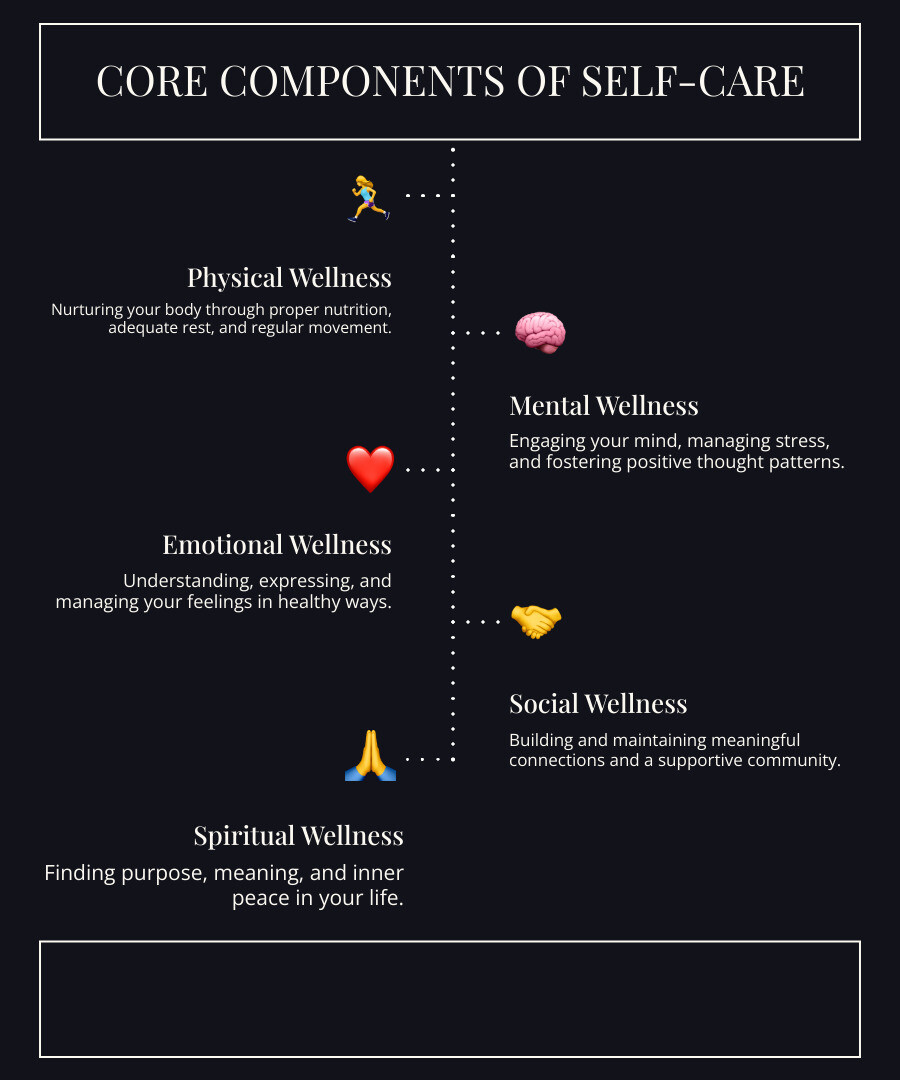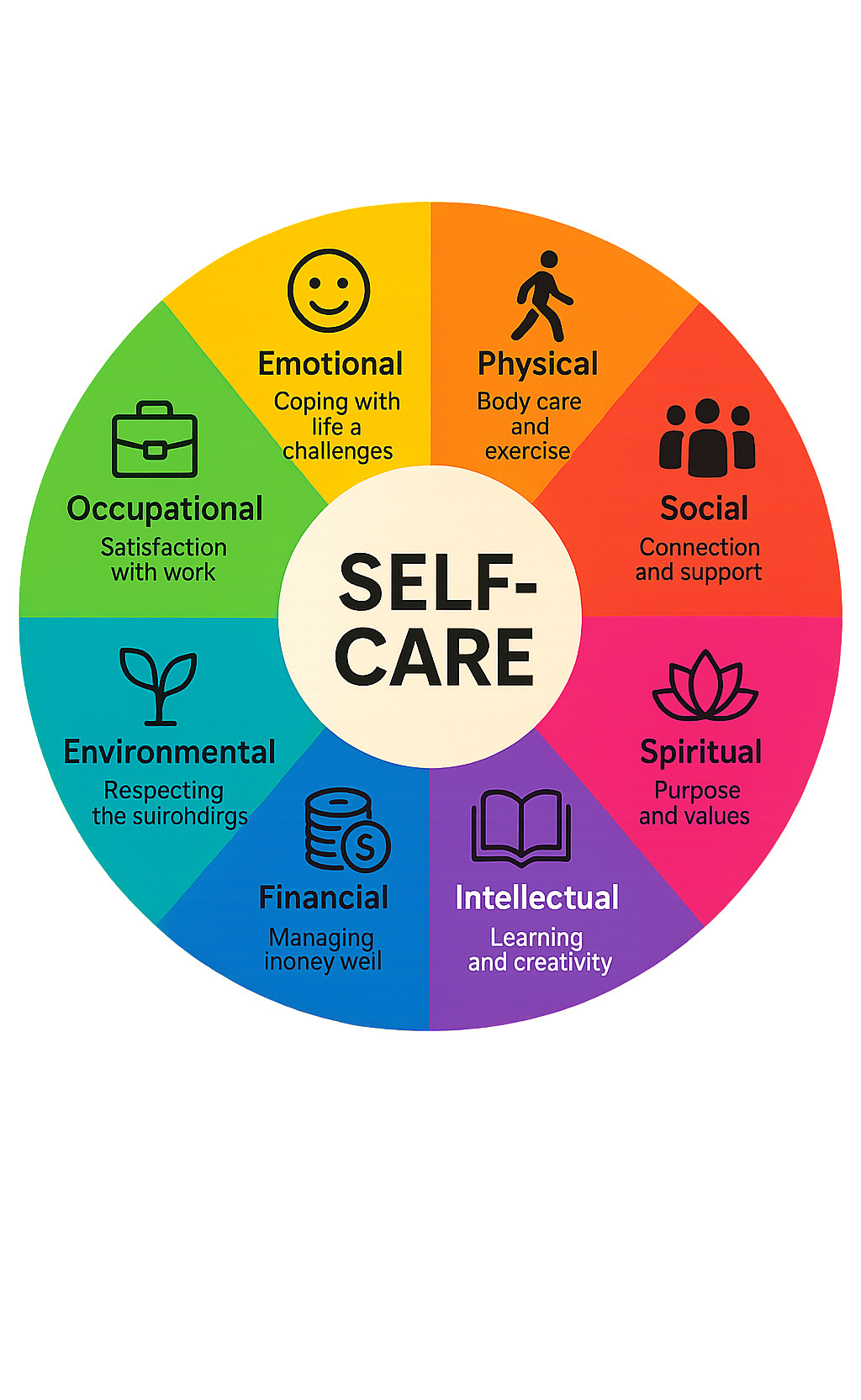Why Self-Care Is Essential for Your Well-Being
Self-Care is the intentional practice of taking action to preserve or improve your own health. It’s more than just occasional treats; it’s about making deliberate choices that support your physical, mental, and emotional well-being.
What Self-Care Really Means:
- Intentional actions to improve your health.
- Proactive wellness, not just reactive responses.
- Personal responsibility for your well-being.
- Sustainable practices that fit your lifestyle.
Self-care is not selfish. The World Health Organization defines it as “the ability of individuals, families and communities to promote health, prevent disease, maintain health, and cope with illness and disability.” Research shows that regular self-care leads to lower stress, better physical health, and an improved quality of life.
Think of the airplane oxygen mask analogy: you must put on your own mask first before helping others. When you’re running on empty, you can’t effectively care for anyone else.
The beauty of self-care is its flexibility. It’s different for everyone and can be as simple as drinking enough water, setting boundaries, or taking a few deep breaths when you feel overwhelmed.

Easy Self-Care glossary:
What is Self-Care and Why Does It Matter?
At its heart, self-care is the conscious choice to put your well-being first. It’s not a selfish act, but a fundamental building block for a healthy life. The World Health Organization (WHO) defines self-care as “the ability of individuals, families and communities to promote health, prevent disease, maintain health, and cope with illness and disability with or without the support of a health-care provider.” This highlights that self-care is about proactive health management and taking responsibility for your well-being.
While spa days are nice, true self-care is about the daily, deliberate choices you make for your physical, mental, and emotional health. It means filling your own cup first so you have plenty to share with others. The benefits are remarkable and touch every part of your life.

When you practice consistent self-care, you’ll notice amazing shifts:
- Stress Reduction: Self-care activities quiet your mind and lower stress hormones. Research shows practices like these lead to reduced stress levels in students.
- Increased Resilience: Nurturing yourself builds a stronger inner core, helping you bounce back from challenges more easily.
- Improved Quality of Life: Feeling good physically, mentally, and emotionally naturally improves your overall happiness and outlook.
- Improved Relationships: A well-rested, less-stressed you is more patient and present, fostering stronger connections.
- Prevention of Illness: Healthy choices like good nutrition and sleep boost your immune system, helping to prevent illness.
The Science-Backed Benefits of Prioritizing You
The positive effects of self-care are backed by science. Committing to regular self-care helps your body and mind work at their best.
- Reduced Stress Hormones: Activities like walking or meditation lower stress hormones, helping you feel calmer. The American Psychological Association’s reports on stress highlight the importance of these practices.
- Lower Risk of Illness: Improving sleep, nutrition, and physical activity strengthens your immune system, reducing your risk of getting sick.
- Increased Energy: Rest, nourishing foods, and movement are key to boosting your energy levels and vitality.
- Improved Focus: A rested mind and nourished body lead to better concentration, problem-solving, and memory.
- Improved Productivity: Taking breaks for self-care prevents burnout and can make you more productive and efficient.
The 8 Dimensions of Wellness: A Holistic Approach to Self-Care
True self-care is about nurturing your entire being. At Beyond Beauty Lab, we believe that true beauty radiates from holistic wellness. The Substance Abuse and Mental Health Services Administration (SAMHSA) provides a framework of eight dimensions of wellness, showing that self-care goes beyond just physical health. When one area is out of balance, it can affect all the others. By addressing all eight, we can build a more resilient and balanced life.

These eight key areas are:
- Emotional Wellness: How we understand and handle our feelings.
- Physical Wellness: Taking care of our bodies.
- Social Wellness: Connecting with others.
- Spiritual Wellness: Finding purpose and meaning.
- Intellectual Wellness: Keeping our minds curious and engaged.
- Financial Wellness: Feeling secure about our money.
- Environmental Wellness: Creating healthy spaces around us.
- Occupational Wellness: Finding joy and balance in our work.
You can Explore SAMHSA’s eight dimensions of wellness framework for a deeper understanding.
Understanding Each Dimension
Let’s look at how each dimension fits into your daily self-care journey.
-
Emotional Wellness: This involves understanding and expressing your feelings in healthy ways. Practice emotional self-care by journaling, talking with a friend, or seeking professional support. The NIH offers a helpful emotional wellness toolkit.
-
Physical Wellness: This is about taking care of your body through nutritious food, hydration, regular movement, and quality sleep. It also includes regular medical check-ups.
-
Social Wellness: We are wired for connection. Nurture your relationships with family and friends, build a strong support system, and set healthy boundaries. The NIH also provides resources for social wellness.
-
Spiritual Wellness: This is about finding meaning and purpose in your life, which isn’t necessarily religious. It can involve meditation, spending time in nature, or practicing gratitude.
-
Intellectual Wellness: Keep your brain active and curious by reading, learning a new skill, or engaging in stimulating conversations. It’s about expanding your knowledge in enjoyable ways.
-
Financial Wellness: This means feeling secure and in control of your finances. It involves understanding your budget, saving, and planning for the future to reduce money-related stress.
-
Environmental Wellness: Your surroundings impact how you feel. This dimension is about creating clean, organized, and peaceful spaces, as well as appreciating and protecting the natural world.
-
Occupational Wellness: Finding satisfaction and balance in your career is vital. This means setting healthy work-life boundaries, taking breaks, and ensuring your work aligns with your values to prevent burnout.
Putting Self-Care into Practice: Actionable Strategies for Daily Life
Understanding self-care is the first step; the magic happens when we weave it into our daily lives. It’s not about grand gestures, but small, consistent actions that create positive shifts. Even 5-10 minutes dedicated to a self-care activity can boost your mood and energy. The key is to find what nourishes you and make it a non-negotiable part of your day.

Physical and Environmental Strategies
Nurture your body and create supportive spaces with these strategies.
Fuel your body with balanced nutrition by mindfully choosing fruits, vegetables, lean proteins, and whole grains. Stay hydrated; water is essential for feeling your best.
Find ways to enjoy regular movement. A brisk walk, dancing, or gentle stretching for 10 minutes can work wonders. A 15-minute walk can boost concentration and energy.
Prioritize quality sleep by aiming for 7-9 hours per night. A consistent bedtime routine and limiting screen time before bed can help.
Decluttering your space can lead to a clearer mind. Spend just 5 minutes tidying your desk or a small corner. Create a relaxing atmosphere with calming scents, soft music, or comfortable lighting.
Mental and Emotional Strategies
Nurture your inner world to build resilience and clarity.
Practice mindfulness by being present. Try focusing on your breath for a few minutes or savoring a cup of tea. When overwhelmed, try simple breathing exercises like taking three deep breaths to calm your nervous system.
Journaling is a great tool for processing thoughts and feelings. It can also be used to practice gratitude, which studies show can reduce stress.
Learn to set boundaries by saying “no” to things that drain your energy. This protects your peace. Make time for engaging hobbies that bring you joy, and try creative expression like drawing or cooking to reduce anxiety.
Lastly, consider a digital detox, especially before bed. Avoid checking your phone first thing in the morning to start your day with intention. For more tips on coping with stress, you can always visit the CDC.
Social, Spiritual, and Intellectual Strategies
These dimensions focus on connection, purpose, and growth.
Prioritize meaningful social connection by spending quality time with people who uplift you. Actively schedule quality time with loved ones; even a quick call can strengthen those vital bonds. Research consistently highlights the strong link between social support and mental health. You can explore more about this link here.
Nurture your spirit with spiritual practices like meditation or spending time in nature. Connecting with the natural world has a wonderfully calming and restorative effect.
Keep your mind sharp by learning a new skill, reading books, or listening to educational podcasts. Challenge yourself and turn downtime into a learning opportunity.
Building Your Personalized Self-Care Plan
Your path to well-being is uniquely yours. There is no one-size-fits-all checklist for self-care. What recharges you might be different from what works for others, and your needs will change as life unfolds. This is why creating a personalized self-care plan is so powerful.
The first step is self-reflection. Take a quiet moment to assess which areas of your life feel neglected or are draining your energy. What activities genuinely make you feel more like you? This honest assessment is your starting point. You don’t need to change everything at once. Start small by picking one or two simple self-care practices that feel manageable. As these become habits, you can add more.
It’s also important to distinguish between true self-care and simple distractions. Are you genuinely refilling your cup, or just temporarily escaping from the fact that it’s empty? True self-care nourishes you long-term.
| Feature | Self-Care | Distraction |
|---|---|---|
| Intent | Intentional actions to nourish and restore yourself | Temporary escape from problems or feelings |
| Outcome | Leaves you feeling recharged and grounded | May provide short-term relief but no lasting benefit |
| Long-term Benefit | Builds resilience and improves overall well-being | Often leaves you feeling the same or worse afterward |
Creating Your Personalized Self-Care Routine
Ready to build your routine? Start by assessing your needs. Think about the eight dimensions of wellness and identify which ones need more attention. Then, set realistic goals. If you don’t exercise, aim for a 10-minute walk three times a week, not a marathon. Small, achievable steps build lasting habits.
Next, schedule self-care activities in your calendar. Treat these appointments as seriously as any other commitment. Finally, track your progress and adjust as needed. Your self-care plan is a living document that should evolve with you. This Printable Habit and Mood Tracker can be a useful tool.
Overcoming Common Misconceptions About Self-Care
Let’s clear up some common myths about self-care.
First, it’s not selfish. Taking care of yourself makes you more capable of caring for others. When your cup is full, you have more to give.
Second, it’s not expensive. Many of the most effective self-care activities are free, like walking in nature, journaling, deep breathing, or talking with a loved one.
Lastly, it doesn’t require a lot of time. Self-care can be woven into small pockets of your day. Five minutes of mindful breathing or a quick stretch can make a huge difference. It’s about consistency, not duration.
An Essential Guide to Self-Care: Tips for a Healthier You
Self-Care is the conscious decision to protect and improve your health, not a once-in-a-while indulgence. By making small, intentional choices every day you lower stress, boost energy and build long-term resilience.
Need quick inspiration? Explore our easy Self-Care glossary:
A flexible routine that fits your life is all it takes to start feeling the benefits.
What Is Self-Care and Why Does It Matter?
The World Health Organization defines Self-Care as “the ability of individuals, families and communities to promote health, prevent disease, maintain health, and cope with illness and disability.” In other words, you have real power over your well-being. Often with simple, everyday habits.
Key evidence-backed benefits:
- Stress reduction: Activities such as journaling or meditation can lower cortisol.
- Better immunity & lower illness risk: Good sleep, movement and nutrition strengthen your defenses.
- Greater resilience & productivity: Rested minds focus better, work smarter and bounce back faster.
For more background, see the WHO’s overview of self-care interventions.
The 8 Dimensions of Wellness: A Snapshot
Well-being is multidimensional. The Substance Abuse and Mental Health Services Administration (SAMHSA) highlights eight areas that work together to keep you thriving:
- Emotional
- Physical
- Social
- Spiritual
- Intellectual
- Financial
- Environmental
- Occupational
Review SAMHSA’s full framework here.
Helpful toolkits for two common focus areas:
- Emotional wellness: NIH guide
- Social wellness: NIH resources
Balancing these dimensions keeps your Self-Care plan holistic without feeling overwhelming.
Putting Self-Care Into Practice: Fast Ideas
Short on time? Even 5-10 minutes of Self-Care can refresh your day.
- Move: Walk, stretch or dance, anything that gets blood flowing.
- Fuel: Drink water and add an extra serving of colorful produce.
- Breathe: Three slow inhales and exhales calm the nervous system.
- Connect: Send one encouraging text; social support is linked to better mental health.
- Unplug: Screen-free moments, especially before bed, improve sleep (see CDC tips).
Choose one idea today, schedule it tomorrow, and build from there.
Building Your Personalized Self-Care Plan
True Self-Care is personal: start where you are, use what you have.
- Assess: Which dimensions feel depleted?
- Set tiny goals: A 10-minute walk or two pages of journaling.
- Schedule it: Add it to your calendar like any meeting.
- Track & adjust: Use this Printable Habit and Mood Tracker to notice what helps most.
| Intentional Action | Outcome |
|---|---|
| Self-Care | Leaves you recharged and grounded |
| Distraction | Temporary escape with little lasting benefit |
Myth-busting: Self-Care isn’t selfish, expensive or time-consuming, it’s a sustainable way to show up as your best self every day.







